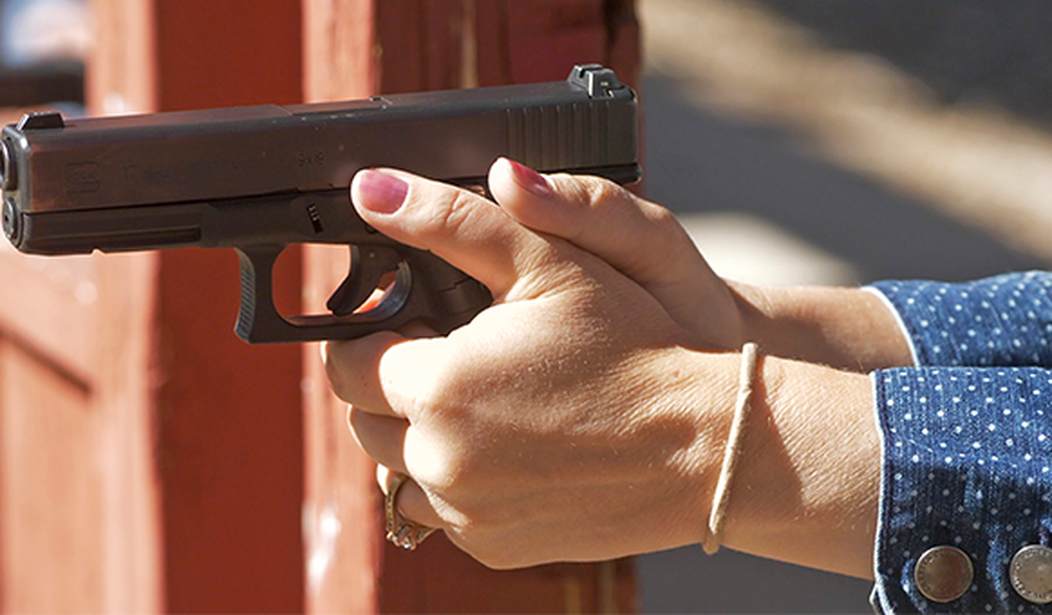For the time being at least, the federal government's prohibition on gun ownership for "unlawful" users of drugs, including those who use marijuana in states where it's legal for recreational or medicinal uses, remains in effect. The statute is, however, coming under increasing scrutiny by the federal courts.
The Fifth Circuit Court of Appeals has already held that the government "could not constitutionally apply § 922(g)(3) to a defendant based solely on her 'habitual or occasional drug use', and now the Eighth Circuit has weighed in, offering a slightly different take but one that still opens the door for marijuana users to exercise their Second Amendment rights.
On Wednesday, a three-judge panel on the Eighth Circuit released its decision in U.S. v. Cooper. holding that depending on the circumstances, the government's blanket prohibition on drug users keeping and bearing firearms can indeed violate an individual's Second Amendment rights.
In every Second Amendment case, the overarching question is whether a limitation on the right to keep and bear arms is "consistent with this Nation's historical tradition of firearm regulation." N.Y. State Rifle & Pistol Ass'n, Inc. v. Bruen (2022). Key to answering that question is identifying "analogue[s]": Founding-era regulations that "impose[d] a comparable burden on the right of armed self-defense" with a "comparabl[e] justifi[cation]." See also United States v. Rahimi (2024) (explaining that the modern regulation "need not be a 'dead ringer' or a 'historical twin'"). If no comparable analogues exist because "disarmament is a [purely] modern solution to a centuries-old problem," or strays too far from the "how and why" of "historical regulations," then the Second Amendment kicks in….
In Veasley, we identified two Founding-era analogues that "make [the drug-user-in-possession statute] constitutional in [certain] applications": "confinement of the mentally ill" and the "criminal prohibition on taking up arms to terrify the people."
Note that the Eighth Circuit's determination in Veasley left open the possibility that § 922(g)(3) could be unconstitutional if it was applied to someone who's not dangerously mentally ill or a risk of terrorizing the people. As the panel explained in Cooper, the historical analogues that justify § 922(g)(3) in certain circumstances are contingent on the individual posing a real risk of harm to themselves or others.
Early in this country's history, the "mentally ill and dangerous" ended up in jails, makeshift asylums, and mental hospitals "with straitjackets and chains." Confinement came with a "loss of liberties," including disarmament, "to preserve the peace of the community." "Those who posed no danger," by contrast, "stayed at home with their families," with "their civil liberties … intact."
The question is whether § 922(g)(3) is "relevantly similar" to this Founding- era analogue. It is, but not for everyone. The "behavioral effects" of mental illness and drug use can "overlap," but only the subset of the mentally ill who were dangerous faced confinement and the loss of arms. It follows that, for disarmament of drug users and addicts to be comparably "justifi[ed]," it must be limited to those "who pose a danger to others." The analogy is complete, in other words, for someone whose "regular use[] of … PCP … induce[s] violence," but not for a "frail and elderly grandmother" who "uses marijuana for a chronic medical condition." The latter would regulate "arms-bearing … to an extent beyond what was done at the [F]ounding."
Much the same goes for Veasley's other analogue, Terror of the People. Initially a common-law crime and later codified in some states, these going-armed laws required more than "mere possession" of a weapon. As "a mechanism for punishing those who had menaced others with firearms," an essential element was "terrorizing behavior … accompany[ing] the possession." Punishment included imprisonment and "forfeiture of the arms" used in the crime. Sometimes, when aggression was foreseeable, magistrates ordered individuals to post surety bonds to "prevent[] violence before it occurred," but only after providing "significant procedural protections."
The lesson to draw is that this analogy only works "for some drug users." When "a court has found that the defendant 'represents a credible threat,'" a ban on firearm possession "fits neatly within the tradition." Rahimi. And so does one applied to drug users who engage in "terrifying conduct." For others, like the hypothetical grandmother, threatening violence or causing terror is "exceedingly unlikely," so the justification for disarmament is not comparable.
So where does that leave LaVance LeMarr Cooper? The Eighth Circuit panel declined to decide whether Cooper is dangerous enough to have forfeited his Second Amendment rights, instead remanding the case back to district court for further review, but it certainly hinted that the government's argument in favor of prosecution leaves a lot to be desired.
The government suggests in its briefing that Cooper is too dangerous to have a gun because he "possessed [one] for protection after [a] recent shooting at his residence." We disagree for two reasons. First, the parties only stipulated that "officers were dispatched to [his] residence … in reference to an individual who had been shot," not a shooting that happened there. And second, "individual self-defense is 'the central component' of the Second Amendment right," not an exception to it. {Marijuana use by itself is not an exception either, even if possessing it breaks federal law.}
I expect SCOTUS will take up the issue at some point, because even the appellate courts are in broad agreement that § 922(g)(3) can be unconstitutional, there are likely to be differences in opinion about when the federal prohibition would be justified. Is it only the character, temperament, and previous criminal history of a drug user that could bar them from possessing or owning a firearm, or does their drug of choice matter too? The Eighth Circuit panel suggests that the type of drug use does matter, and that a pot-smoking granny is far less likely to pose a danger than someone who regularly consumes PCP. If nothing else, the panel's decision is certainly a step in the right direction for medical marijuana patients, even if the federal statute remains in effect and puts them at risk of prosecution.









